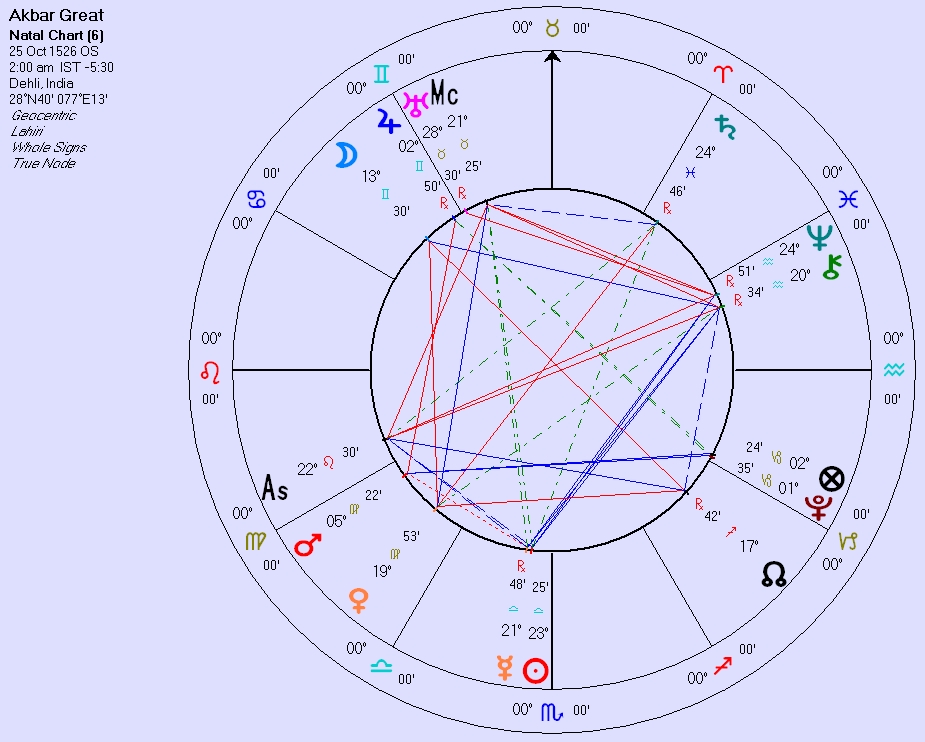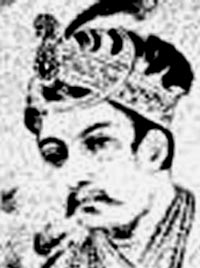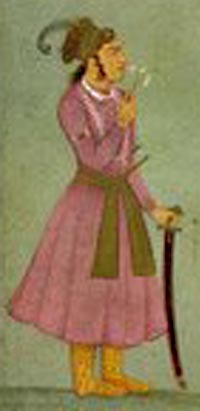Copyright Michael D. Robbins 2006
Astro-Rayological
Interpretation & Charts
Quotes
Biography
Images and Physiognomic Interpretation
Morya is the Chohan of the first ray Ashram. Presumably, as He is a Chohan, and as Chohans have achieved the sixth initiation, at which point they become monads in expression, His monadic ray is the first ray of Will and Power.
“Morya Remembrance Day” is designated as March 24th, thereby linking Him with the fiery sign, Aries. The type of yoga which Master Morya has promoted is Agni Yoga, the “Yoga of Fire”. No conventional chart is available for Master Morya, though, presumably, in the archives of the Great Ones, such charts exist.
One is tempted to associated the sign Leo with him as well as Aries, as so ofen, He has been the great monarch— whether as King Solomon or as Akbar. There are similarities, as well, to Charlemagne (though no hypothesis that they are the same entity is thereby suggested) .
For His great love of beauty (evidenced in the lives of both Solomon and Akbar), the fourth ray is suggested Aries - R1
“No man should be interfered with on account of religion, and anyone is to be allowed to go over to a religion that pleases him”. Akbar made this declaration at a time when most of Catholic Europe was given over to the Inquisition.
Akbar is recorded as saying "A monarch should be ever intent on conquest, lest his neighbours rise in arms against him."
See extensive biography of Akbar online
Born Jalaluddin Muhammad Akbar, and later titled Emperor of Mughal Empire, (alternative spellings include Jellaladin, Celalettin) also known as Akbar the Great (Akbar-e-Azam)
OR? BIRTHDATE is
25th oct 1542 2am Sunday morning Delhi India? Leo rising - Lahiri zodiac
He was born October 15, 1542, in Umarkot, Sindh, and died in October 27, 1605. He was the son of Humayun whom he succeeded to become ruler of the Mughal Empire from 1556 until 1605.
Akbar was the third Mughal emperor and true founder of the Mughal Empire, reigning from Afghanistan to the Bay of Bengal and from the Himalayas to the Godavari River in south. He was the most powerful face on Earth in the 16th century and considered the greatest of the Mughal emperors. .
Akbar did not go to Persia with his parents, and was raised for a time instead by his uncle Askari and his wife in the rugged country of Afghanistan rather than in the splendor of the Persian court. He spent his youth learning to hunt, run and fight, but he never learned to read or write. However, despite his illiteracy, Akbar would grow to possess considerable knowledge and love for Indian literature.
Following the chaos over the succession of Islam Shah, Humayun reconquered Delhi in 1555, leading an army partly provided by his Persian ally Shah Tahmasb. Only a few months later, Humayun died from an accident. Akbar succeeded his father on February 14, 1556, while in the midst of a war against the Sikhandar Shah for the reclamation of the Mughal throne.
When Akbar was only 13 years and 9 months old, Humayoon died and Akbar donned a golden robe and Dark Tiara and was proclaimed "King of Kings". He was an illiterate prince, but as a crowned emperor he proved himself a skilled conqueror and administrator. Not only did he expand his empire’s peripheries but also explored the various fields of art and patronized them. It were those ‘nine jewels’ (nau-ratna) coveting various fields, which pillared his vast empire for almost half a century. His military valor definitely played the lead in expanding boundaries. Akbar ruled, when conspiracies were common in every walk of life.During his reign, he eliminated external military threats .
However, Akbar's most lasting contributions were to the arts and to Indian religion. He made several reforms, and created a compilation of the best things from every religion. He initiated a large collection of literature, and incorporated art from around the world into the Mughal collections. He commissioned the building of widely admired buildings, including the Panj Mahal. Having a greatly tolerant attitude of religion, Akbar preserved Hindu temples and began a series of religious debates where Muslim scholars would debate religious matters with Sikhs, Hindus, Carvaka atheists and even Jesuits from the Vatican.
Akbar founded his own religion, the "Divine Faith"; the religion, however, was either a form of personality cult for Akbar, or reserved for only upper nobility of Akbar's court. Historians have only identified 18 members of this new religion, which quickly dissolved after his death.
Akbar is said to have been a benevolent and wise ruler, a man of new ideas, and a sound judge of character. As a ruler, he was able to win the love and reverence of his subjects. Even a hostile critic described him as having a commanding personality. He was fearless in the chase as well as in the field of battle, and, "like Alexander of Macedon, was always ready to risk his life, regardless of political consequences".
He often plunged his horse into the full-flooded river during the rainy seasons and safely crossed over to the other side. Though a mighty conqueror, he did not usually indulge in cruelty. He is said to be affectionate towards his relatives. He is said to have been extremely moderate in his diet, eating fond of fruits and had little liking for meat, which he ceased to take altogether in his later years. However, some believe he was a hard alcoholic, and possessed inordinate "lust" for women. However, some historians believe the mention refered to the Emperor's care and affection to protect women, especially virgins, even though it appears he permitted wine and prostitution near the palace.
He also married several Hindu princesses, though many consider that to be politically motivated rather than a genuine attempt at religious reconciliation.
At the time of Akbar's rule, the Mughal Empire included both Hindus and Muslims. Profound differences separate the Islamic and Hindu faith. When Akbar commenced his rule, a majority of the subjects in the Mughal Empire were Hindus. However, the rulers of the empire were almost exclusively Muslim. In this highly polarized society, Akbar fostered tolerance for all religions. He not only appointed Hindus to high posts, but also tried to remove all distinctions between the Muslims and non-Muslims. He build a House of Worship, where he encouraged religious debate. Originally, this debating house was open only to Sunnis, but later encouraged Hindus, Catholics and even atheists to participate.
His moves from Islam, while welcomed by the Hindu majority, where not appreciated by the Muslim faithful. Rumours were rife that Mosques were being closed and destroyed, that those who entered his Harem were required to say "There is no God but Allah, and Akbar is his messenger" a bastardised version of the traditional Muslim Shahada, or declaration of faith. Ultimately, despite Akbar's attempts at reconciling the two major faiths, by the end of the 16th Century community relations were to be worse than when Akbar ascended to power.
Although Akbar was illiterate, he took interest in philosophy, theology, history, and politics and maintained a library full of books on various subjects, and was fond of the society of scholars, poets and philosophers, who read books to him aloud. Akbar had a number of Sanskrit scientific works translated into Persian, as well as it is said Akbar employed a Jesuit missionary to translate the four Gospels of the New Testament into Persian.
The last few years of Akbar's reign were troubled by the misconduct of his sons. Two of them died in their youth, the victims of intemperance. The third, Salim, later known as Emperor Jahangir, was frequently in rebellion against his father. Asirgarh, a fort in the Deccan, proved to be the last conquest of Akbar, taken in 1599 as he proceeded north to face his son's rebellion. Reportedly, Akbar keenly felt these calamities, and they may even have affected his health and hastened his death, which occurred in Agra. His body was interned in a magnificent mausoleum at Sikandra, near Agra.




